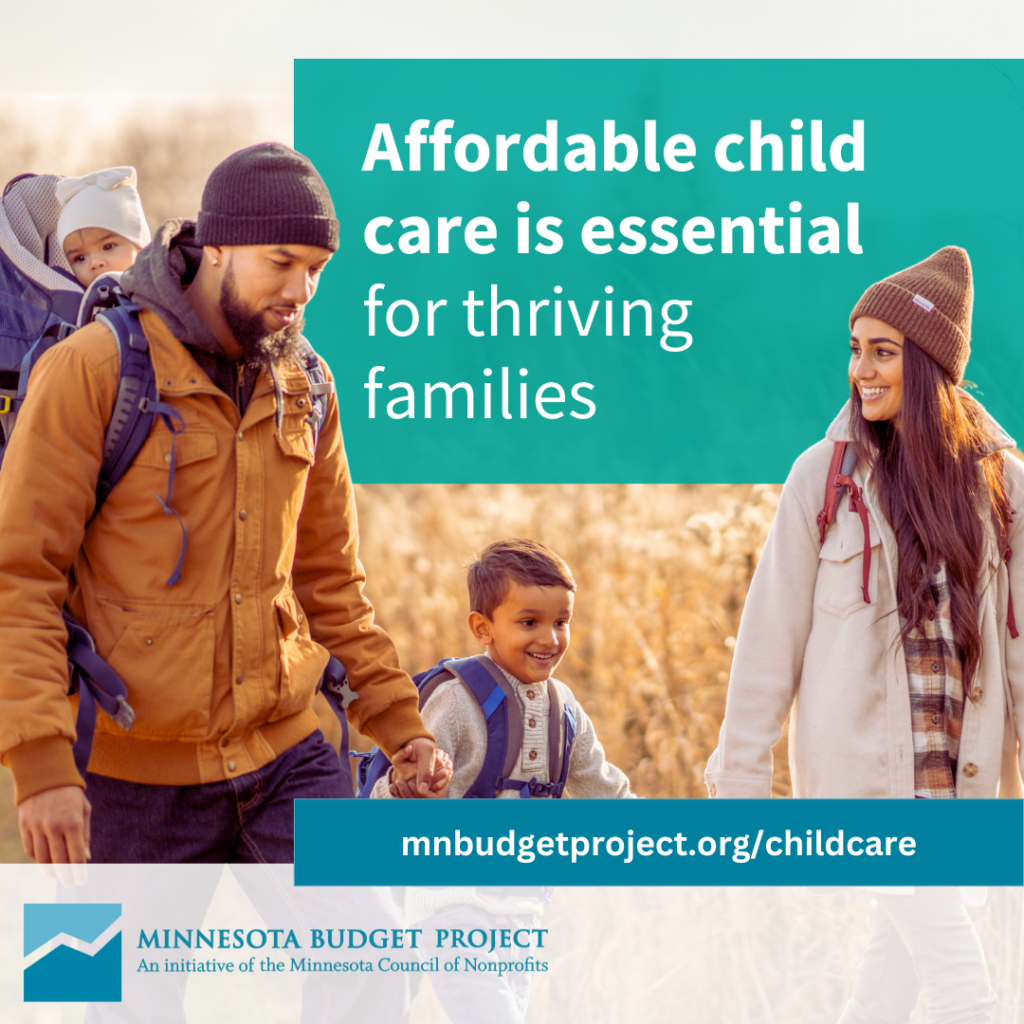Investing in affordable child care so Minnesota families can find the care they need
The Minnesota Budget Project has long sought public investments in making child care affordable to more families. To ensure the best future for children and families, we support policy changes so that all Minnesotans have affordable child care so parents can work or go to school, children get off to a strong start, and employers can attract and retain the workers they need.
We support the Great Start framework to achieve the following goals:
- Affordable and accessible child care and early learning for families;
- High-quality child care and early learning for all children, regardless of race, income, or zip code; and
- A child care and early learning system that equitably compensates and supports a diverse early childhood educator workforce.
Our policy priority: Great Start Affordability Scholarships
Great Start Affordability Scholarships are a new policy solution designed to lower monthly child care costs for families across Minnesota. Here’s how they could work:
- Families could qualify if they have children under 5. Children receiving scholarships would receive them for a 12-month period.
- Great Start Scholarships would reach a wide income range of families.
- The amount of Great Start Scholarships would be determined on a sliding scale based on family income, providing more support to families with more modest incomes.
- Great Start Scholarship payments would go directly to a family’s child care provider, reducing the amount of the family’s monthly child care bill. These payments would be paid prospectively to ensure providers have the upfront resources to care for the children.
- Great Start Affordability Scholarships would use public infrastructure already in place to make it easier for families to apply.
What’s at stake?
Affordable, dependable child care helps children thrive, parents work or go to school, and employers fill essential job openings. The strength of the state’s economy depends on greater participation of Minnesotans in the labor force. Minnesota can’t afford to leave working parents on the sidelines because they lack access to affordable child care.
Public policy solutions should address the fundamental problem that Minnesota families struggle to afford child care while, at the same time, those working to provide this essential care and early education are paid notoriously low wages.
Child care story collection
We are collecting stories from Minnesotans who have faced challenges finding affordable child care, who know firsthand the difficulty of earning a living wage in the child care sector, or struggle to retain valuable workers as an employer due to lack of child care. Your voice is crucial in our fight for policies that guarantee every Minnesota family has access to affordable, quality child care—allowing parents to work or continue their education, children to thrive, and employers to retain the workers they need.
Your story can be a powerful tool in shaping policies that make Minnesota a state where every family and child can thrive.


Great Start Scholarships issue brief
The Great Start Scholarships issue brief looks at this new policy solution designed to lower monthly child care costs for families across Minnesota and how they could work.
Latest blog posts
-
Federal Freeze of Child Care, TANF, other social service funding could leave Minnesotans and their families in the cold
On January 6, 2026, the Trump administration froze billions of dollars in federal funding for child care and social services READ MORE
-
Governor Walz’s revised FY 2026-27 budget proposal makes some additional changes as budget conditions tighten
In March, Governor Tim Walz released his revised budget proposal, which updates the initial budget proposal he released on January READ MORE
-
Our first look at Governor Walz’s FY 2026-27 budget proposal
For analysis of Governor Tim Walz’s revised FY 2026-27 budget proposal, see Governor Walz’s revised FY 2026-27 budget proposal makes READ MORE
Share our resources
As trusted voices in our communities, nonprofits and community leaders play a key role in advocating for policies that ensure all Minnesota families have access to affordable, high-quality child care. Share our free digital resources through your social media channels, websites, and newsletters to advocate for more affordable child care.


Great Start MN
Great Start MN is a group of organizations working together to help Minnesota implement the Great Start framework and recommendations to transform Minnesota’s child care and early learning system so that every child gets off to a great start.
